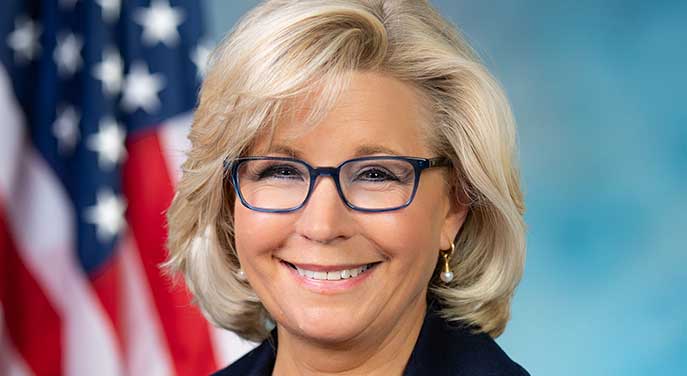 There was a time not too long ago when Liz Cheney was regarded as a loyal conservative and Republican.
There was a time not too long ago when Liz Cheney was regarded as a loyal conservative and Republican.
The eldest daughter of former American vice-president Dick Cheney made a name for herself as an attorney and in several State Department positions during then-president George W. Bush’s administration. She won Wyoming’s at-large congressional seat in 2016 with 62 per cent, which increased in subsequent elections to 63.6 per cent (2018) and 68.6 per cent (2020). She quickly moved up the ranks to become House Republican Conference chair from 2019 to 2021, the party’s third-highest position in the pecking order.
A long, successful political career seemed to be in the cards for Cheney. That house came crashing down in spectacular fashion, however.
Days after the U.S. Capitol attack on Jan. 6, 2021, Cheney announced she was in favour of impeaching then-president Donald Trump for his perceived role in this stunning historical moment. She was one of 10 Republicans to vote for his impeachment on Jan. 13.
“The president of the United States summoned this mob, assembled the mob, and lit the flame of this attack,” she said. “Everything that followed was his doing. None of this would have happened without the president. The president could have immediately and forcefully intervened to stop the violence. He did not. There has never been a greater betrayal by a president of the United States of his office and his oath to the constitution.”
Cheney’s vitriol was wholly unexpected. She had been a loyal supporter of Trump from the start, voting in line with the president’s positions 92.9 per cent of the time. As noted by Forbes’ national politics reporter Jack Brewster in a May 6, 2021, piece, this tally was “about middle of the pack” among House Republicans and “ahead of former Rep. Mark Meadows, Trump’s ex-chief of staff, and fierce Trump allies Reps. Jim Jordan of Ohio and Mo Brooks of Alabama.”
What changed?
If we’re to believe Cheney, it was a combination of frustration surrounding the Jan. 6 attack and Trump’s refusal to admit he lost the 2020 U.S. presidential election.
“I am a conservative Republican, and the most conservative of conservative values is reverence for the rule of law,” she wrote in a May 5, 2021, Washington Post opinion piece. “Each of us swears an oath before God to uphold our constitution. The electoral college has spoken. More than 60 state and federal courts, including multiple Trump-appointed judges, have rejected the former president’s arguments and refused to overturn election results. That is the rule of law; that is our constitutional system for resolving claims of election fraud.”
We can certainly accept the premise that she was irritated with Trump’s actions. Nevertheless, could this frustration have caused a massive 180-degree tilt toward anger, disgust and describing him in June as a “dangerous and irrational man” and a “domestic threat”? Could it have also led her down a path to support impeachment and serve as vice-chair of the Jan. 6 committee?
It’s possible but seems unlikely. Going from one extreme to the other, even in today’s ideologically rigid political environment, seems a bit absurd.
Was Cheney looking for an easy route to dispose of Trump and become her party’s 2024 presidential candidate?
By assuming these high-profile critic roles, she could shed her loyalty to Trump as a necessity to defend the country and constitution, and assume the role of the Republican’s white knight.
It’s also possible but seems equally unlikely. There’s no political advantage to turning off senior Republicans, as Cheney has done for more than a year. It’s made her previous support of Trump’s presidency look fraudulent, and her actions have been described by some Trump and party supporters as almost traitorous.
That’s why she was removed as House Republican Conference chair on May 12, 2021, and replaced by New York’s Elise Stefanik. The Wyoming Republican Party then removed her recognition as a member on Nov. 13, 2021, by a 31-29 vote, and she was censured by the Republican House Committee on Feb. 4, 2022, for taking part in the House investigation of the Capitol attack.
If that wasn’t embarrassing enough, she was trounced in the Aug. 16 Wyoming Republican congressional primary. Harriet Hageman, an attorney with the backing of prominent Republicans like Trump and House Minority Leader Kevin McCarthy, won with 113,025 votes, or 66.3 per cent. Cheney finished a distant second with 49,316 votes or 28.9 per cent.
Cheney has claimed she’ll continue to fight against Trump’s impending 2024 presidential campaign. She wants to be “the leader, one of the leaders, in a fight to help to restore our party” and is considering her own presidential bid. Some Republicans and Democrats were mildly intrigued by this possibility, while others warned it could help boost the former president’s fortunes.
No independent presidential candidate has ever sat in the White House, and Cheney won’t end that drought. It’ll be astonishing if she ever finds a route back to Washington. As a disloyal conservative and Republican, her political fate has largely been sealed – and she has no one to blame but herself.
Michael Taube, a Troy Media syndicated columnist and Washington Times contributor, was a speechwriter for former prime minister Stephen Harper. He holds a master’s degree in comparative politics from the London School of Economics.
For interview requests, click here.
The opinions expressed by our columnists and contributors are theirs alone and do not inherently or expressly reflect the views of our publication.
© Troy Media
Troy Media is an editorial content provider to media outlets and its own hosted community news outlets across Canada.


